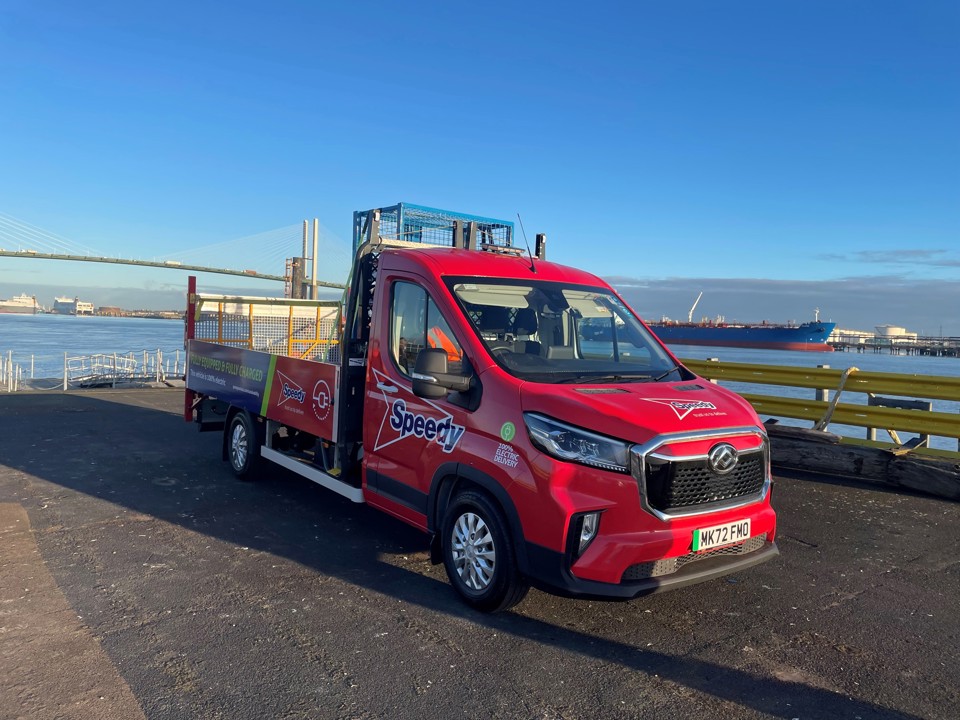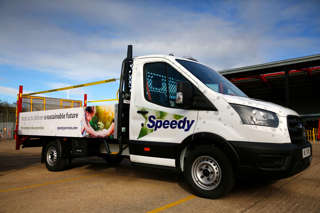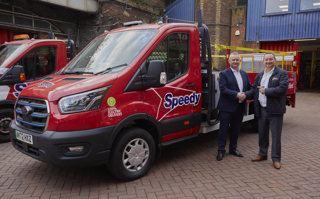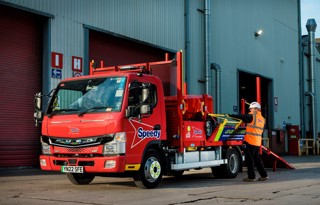Fleet operators Speedy Services and Lyreco are taking part in a trial to deliver goods by boat along the River Thames, with the potential to remove vans from their fleets, save time and cut carbon emissions.
The month-long London Light Freight River Trial is part of a £1 million Defra-funded Clean Air Logistics for London project, which aims to move more freight into London via river rather than road.
Cross River Partnership (CRP), which launched the trial and is working with a number of partners including the Port of London Authority, says that bringing goods into central London in this way is proven to emit less than half the carbon of road transport, improving local air quality and congestion.
CRP’s previous river freight trial saw a 78% saving in NOx and an 88% saving in CO2 compared to traditional road-based delivery methods.
Speedy Services estimates that if it were to switch from using the road to the river for some of its deliveries in central London it could save 21,840 road miles per annum and cut carbon by 12,389kg (based on not using an 18-tonne diesel vehicle).
For the trial it is using a Maxus eDeliver 9 dropside electric vehicle to transport goods from its Erith workshop in south-east London to the Dartford International Freight Terminal (DIFT). The goods, which are stored in cages, are then wheeled directly onto a secure cargo platform on a Thames Clipper logistics boat, which stops at Trinity Buoy Wharf and then Bankside Pier.
The stops marry with Speedy Services’ east-london and central London depots. It is using a Maxus eDeliver 9 Box Curtain vehicle to collect the goods from the piers and then deliver them back to the depot for stock or direct to a customer.
Goods that need to be returned are also picked up at each pier location and later transported to DIFT. This is the first time CRP has incorporated return deliveries in a river freight trial.
Aaron Powel, fleet director at Speedy Services, said that returning repair products to Speedy’s Dartford workshop by road is problematic as the vehicles are often full and it’s not possible to get all the goods on, which results in a backlog. Using the boat for returns overcomes this.
The trial is demonstrating a significant time saving too.
“Getting from Dartford to Bankside by road is about a two-hour journey and we do it twice a day,” Powell said. “That same journey takes about an hour on the boat as there’s no congestion. It effectively takes two vehicles off London’s roads for the equivalent of a four-hour round trip.”
Powell believes there is potential to incorporate other locations in the future (North Greenwich, Wandsworth, Battersea, and St George Wharf), which could all utilise electric vehicles as well as the river as Speedy Services has 100 Ford E-Transit Chassis Cabs on order.
Grid Smarter Cities is providing the charging infrastructure at Bankside for Speedy’s EV but Speedy also has chargers fitted at the depots involved in the trial, with more charging infrastructure being rolled out at its other locations.
Parking has not proved a problem as Speedy Services is able to book a parking space at Bankside in advance.
The challenge is making sure that enough goods do go by boat. There is potential for Speedy and Lyreco to have goods totalling 6,000kg.
Lyreco has started slowly with the amount of goods it is sending on the boat - just two to four pallets during the first week of the trial - but that is increasing now that the journeys have proved successful.
Items are picked from Lyreco’s head office in Telford and trunked by a third party to Dartford and then loaded onto the Thames Clipper Logistics vessel by the crew. The goods stay on the boat until Bankside where they are collected by e-cargo bike courier company Pedal Me for last-mile delivery to customers.
Customer orders are sent to Pedal Me the night before, allowing them to plan the routes in advance.
While it’s not possible for Pedal Me’s e-cargo bikes to carry a very large product, such as a noticeboard, they can carry the majority of Lyreco’s products.
Richard Taylor, head of operations for supply chain at Lyreco UK and Ireland, said that the trial will help establish how much can be done through Pedal Me.
Other key learnings will be the process of getting goods to the boat, how much the boat can take and what it can take.
John Ward, Lyreco’s distribution operations manager, added: “The more that we can push through that solution the more benefits it brings us.
“On average, a van probably takes no more than two to three pallets. We’ve been allocated six pallets on the Thames Clipper so we want to see if we can get to a point where we can take two vans off the road.”
Removing vans makes sense from a business and sustainability perspective. “Lots of companies are moving over to electric vehicles - by the end of this year a third of our commercial vehicle fleet will be electric - but it doesn't reduce the actual congestion on the road and it’s becoming more difficult to do deliveries with a vehicle into the centre of London,” Ward said.
Both Lyreco and Speedy Services are optimistic about the potential for the river as an alternative to the road and Powell believes more fleets should consider it.
The potential for the project is “massive”, he said.























Login to comment
Comments
No comments have been made yet.